
OCTOBER 2005
A Mediatised Performance Conference
(http://media.arts.unsw.edu.au/eperformance/)
From Frank Ancel
01 and 02 December 2005
The School of Media, Film & Theatre, University of New South Wales, Australia
Introduction
This international symposium will address cross- and multi-disciplinary investigations of issues around media/technology-based performance. Delegates will participate from interstate as well as overseas. Paralleling the diversity and range of artistic and theoretical approaches to media-based performance, conference contributors will present multi-modally, including live video interventions by speakers outside Australia, live performances, as well as presentations of scholarly papers and practice-led research.
This event presents a unique opportunity for a wide range of media arts/performance practices to be discussed within an interdisciplinary environment.
Invited Speakers
Philip Auslander (Georgia Institute of Technology, USA)
Johannes Birringer (Performance and Media Choreographer, Germany/USA/UK)
Jane R. Goodall (University of Western Sydney, AUS, discussant)
Michael Rush (Curator and Author/Critic, USA)
Stelarc (Performance Artist, AUS)
'Live' Performance by
Russell Richards (Digital Media Artist, UK)
Julie Vulcan (Artist/Performer, AUS)
Michaela Reiser (Digital Media Artist, UK)
Hellen Sky (Telematic Dancer/Choreographer, AUS)
Full details are available at: http://media.arts.unsw.edu.au/eperformance/
Enquiries: Yuji Sone, Conference Coordinator, y.sone@unsw.edu.au,
Tel +61 2 9385 4862, Fax +61 2 9662 2335
::posted on ::fibreculture:: mailinglist for australasian
::critical internet theory, culture and research
::(un) subscribe info and archive: http://www.fibreculture.org
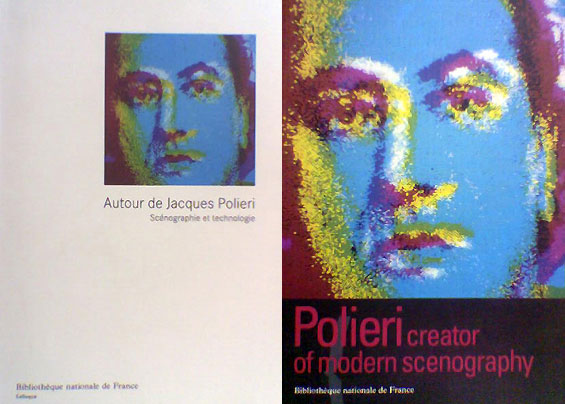
Franck Ancel (Paris)
Franck
Ancel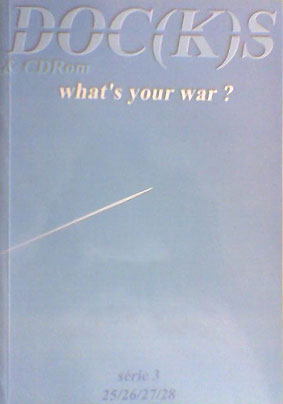
Born in 1970, France, Franck Ancel works
in Paris. He has been probing technology for more than
fifteen years. He has traced the development from the
avant-gardes artists of the last century to the recent
mutations of creation on a planetary scale. He has thus
organized and coordinated symposiums, expositions, and
performances in cooperation with associations and
institutions. Franck Ancel challenges the viewer outside
traditional frontiers, by projecting a setting of a
network of information on screens. At the same time, he
analyzes this technique on a more theoretical level in
texts and talk.
From scenograpy he moved on to the planetry network: an entity of creations,publications, conferences and installations. In continuation of its tryptich AIT in France " Architecture - Image - Technology these communications prepare for a further rendez-vous.Ancel now inhabits the planetry space of technology to fall into and under the reality of the imaginary : A World Fair, or a World Tour - like the solarimpulse plane or like the City of Shanghai between the now and 2010.www.franck-ancel.com
HIS WEB-SITE HAS A FINE PAGE OF IMAGES AND A FRENCH
TEXT.:
http://www.franck-ancel.com/photos/ohm/Le-spectacle-sans-fin.pdf
and a fascinating web-site with details of the many
events he has taken part in since 1960 Sigma events in
Holland and France.
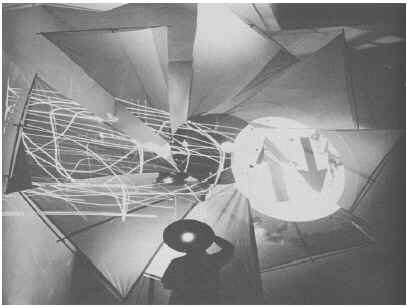
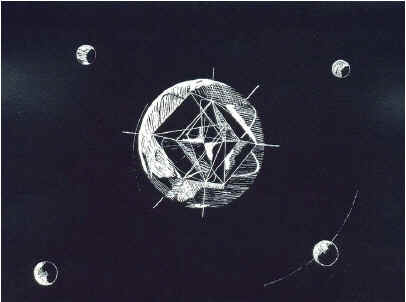 Aussi
sans faire de prospective futuriste et au-delà du
nécessaire retard dans le monde des arts pour
appréhender ce type de spectacles et de\par recherches,
que je viens d’évoquer trop rapidement devant vous,
avec les figures de Milton Cohen et Jacques Polieri.
Notre position anticipatrice\par s’oriente de même
vers une quête presque métaphysique de la matière par
l’art du spectacle. Qui semble au moins une possible
introduction au\par spectacle de ce soir. Mais comme vous
l’aurez compris en écoutant les pratiques
évoquées chez Cohen et Polieri, il y a déjà presque
un demi siècle.\par Nous sommes tout de même en attente
de nouveaux lieux, et de conditions de productions
capable d’accueillir ces nouvelles/vieilles
créations, car\par elles sont toutes sauf normalement
inscrites dans une salle à l’italienne. Peut-être
est-ce d’ailleurs la seule et réelle question
importante et\par permanente autour du « Spectacle
vivant et de la technologie » difficilement abordable ?
Aussi
sans faire de prospective futuriste et au-delà du
nécessaire retard dans le monde des arts pour
appréhender ce type de spectacles et de\par recherches,
que je viens d’évoquer trop rapidement devant vous,
avec les figures de Milton Cohen et Jacques Polieri.
Notre position anticipatrice\par s’oriente de même
vers une quête presque métaphysique de la matière par
l’art du spectacle. Qui semble au moins une possible
introduction au\par spectacle de ce soir. Mais comme vous
l’aurez compris en écoutant les pratiques
évoquées chez Cohen et Polieri, il y a déjà presque
un demi siècle.\par Nous sommes tout de même en attente
de nouveaux lieux, et de conditions de productions
capable d’accueillir ces nouvelles/vieilles
créations, car\par elles sont toutes sauf normalement
inscrites dans une salle à l’italienne. Peut-être
est-ce d’ailleurs la seule et réelle question
importante et\par permanente autour du « Spectacle
vivant et de la technologie » difficilement abordable ?
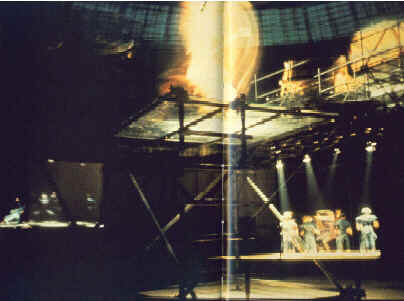
4th October Letter from Franck Ancel:
After one communication "SPN for urban screens"
in Europa, one poster "SPN to refresh!" in
America, these english presentations are soon/now online
pdf. Next rendez-vous SPN in Africa->Oceania->Asia.
e-by FA http://franck-ancel.com
PS: with a special ;-) after Banff to invisible community
who swim in the fresh dawn or to see the fawn at
morning.Enclosed: From: "Brett Neilson" <B.Neilson@uws.edu.au>
Sent: Tuesday, October 04, 2005 10:24 AM
Conference review: Capturing the Moving
Mind
The following review of the 'Capturing the Moving Minds'
conference was published in the Italian newspaper Il
Manifesto on 2 October 2005. The Italian version is
available at:
http://www.ilmanifesto.it/Quotidiano-archivio/02-Ottobre-2005/art83.html
I append an English version below.
A window on the world
>From Helsinki to Beijing on board the trans-siberian
train. A mobile conference of activists, artists,
researchers and mobile communications experts, gathered
to investigate the new logic of the economy and generate
forms and practices of resistance to global control.
'Capturing the Moving
Mind,' an itinerant event organised by the journals
Ephemera and Conflitti Globali.
Brett Neilson
To move without cause, to organise without ends, to flee
the war against intellect: these were the imperatives
that animated the conference held on the trans-siberian
train: 'Capturing the Moving Mind: Management and
Movement in the Era of Permanently Temporary War'
(September 11-20, 2005).
Organised by a group surrounding the online journal
Ephemera: Theory and Politics in Organization (http://www.ephemeraweb.org/index.htm)
and affiliated with Framework: The Finnish Art Review and
the new Italian journal Conflitti globali, the conference
brought together activists, artists, mobile communication
experts, filmmakers, musicians, and researchers of all
stamps. In reality, this moving event was something more
than a conference. The rhythm of the train, the changing
landscapes, the
interactions with strangers, the border controls and
currency exchanges: all imposed contingencies that
demanded constant interrogation and shifts of
perspective. At the same time, the train functioned as a
kind of protective shell, like the set of a reality TV
show, removing the participants (their discussions and
creations) from the world that flitted by outside. Yet,
in this isolated space, there was time for rumination,
intimacy, withdrawal, and debate - an ongoing group
dynamic, fight or flight, contained by neither the many
nor the one.
It is not difficult to criticise an undertaking like
this: a pack of intellectuals, activists, and artists,
predominantly white and English-speaking, speeding past
impoverished towns, disputing the finer
points of immaterial labour while aestheticizing the
crumbled factories on the way. To be sure, the paradoxes
of this situation were sharpened as the train continued
on its arrogant line, like Benjamin's angel, but with its
face unturned, oblivious to the storm behind. The outside
world, as it were, reacted back on the group, sparking
internal dissension, stunts of devil's advocacy, and, in
one case of one participant whose passport was stolen,
delicate negotiations at the German consulate in
Novosibirsk. It is tempting, following the formulation of
another participant, to characterise the event in
temporal-historical terms: a bunch of people from the
twentieth century, hurtling past nineteenth century
villages on their way (like the business leaders of our
times) to find the twenty-first century in Beijing. But a
mere stroll around Beijing, let alone Moscow, reveals the
limits of this elegant summation.
In these former second world cities, the first world
implodes upon the third. All the global divisions can be
found in a single locale. The petrodollars that swell the
pockets of the Russian oligarchy do not trickle down. The
houtons of Beijing, rapidly being cleared for the 2008
Olympic Games, border on corporate skyscrapers and
department stores. As the local participants in both
Moscow (Michael Chernyl) and Beijing (Zhiyuan Cui and
Wang Hui) insisted, the concept of capitalism is too wide
to explain what is happening in these urban laboratories.
If, as Deng Xiaoping once said, 'we do not know what
socialism is,' perhaps today we need to add, 'we also do
not know what capitalism is.' For it is the very
precariousness of capital, its constitutive exposure to
venture and risk that makes it impossible to isolate as
an empirical object. As that most abstract of
abstractions,
capital produces an -ism to which nothing (but almost
anything) can attach. Doubtless, this is why it
propagates so incessantly. And perhaps this is also why
the power that it breeds is so mad, indeterminate and
arbitrary, no more so than at a time of seemingly
permanent war.
It was the emergence of the new forms of global control
(which find their principal mode of being in war) that
occupied the conference's critical core. Beyond the state
of exception, beyond the borders and fences, beyond the
humanitarian tragedies and suicide bombings, there
operates a new and seemingly pure power that functions
without institutional legitimation and seems to change
day by day. The control of the mind, of collaboration
between minds, of feelings, affects and the generic human
capacity to relate is the borne of this power. Under its
sway, politics melds with productivity
and the primary struggle becomes a fight for the free use
of human minds. It is no longer a matter of this or that
issue, this or that injustice. When power becomes
detached from any single logic or rationale, all that
remains is to stay on the move, to meet its madness with
a delirious rigour that shifts, twists and compulsively
derails. With such movement, there emerges a variety of
experience that motivates itself and, in so doing,
acquires the quality of an experiment - a kind of pure
theoretical practice that attempts to create
something new. This, in essence, was the gambit of the
conference, locking away forty brains and bodies in a
train and leaving them to sense as well as cogitate. Can
there, could there emerge from such an experiment a new
form of politics, another way of being, within and
despite the frenzy of global control?
The trans-Siberian journey was kind of learning without
pedagogy, an exercise in improvisation as much as
organisation, a passionate encounter where relations by
hand, touch, and intuition (although not necessarily
physical) outweighed those that occurred on the cusp of
understanding. Beyond the lands of the Roman alphabet,
with only one Russian and one Mandarin speaker, the signs
become illegible and the entire symbolic realm of
language begins to fall away - imposing itself as a kind
of barrier, sure, but also opening new vistas of intimacy
that are neither communicative nor symbiotic. To buy food
on the platform, one was left only with the hands -
pointing, counting the fingers, expressing gratitude by
joining the palms. Some used digital cameras to display
the items they wanted to purchase. But this gestural
economy, importantly motivated by commodity exchange,
could not go unnoticed by the group. Obsessed with the
movement of the economy from the limited sphere of
rationality to the in-born and adaptive human faculties,
the discussion constantly veered back to these chance
encounters. Perhaps because this accidental ethnography -
more than the internal group dynamic - registered how the
purity of experience is always contaminated by
contingency and context.
The memory traces of this event were already under
construction before it began. Part of the process
involved the use of newly invented 'mobicasting' software
to feed images and sounds via mobile phone from the train
to a website (http://www.kiasma.fi/transsiberia)
and display in the Kiasma Museum of Contemporary Art in
Helsinki. An exercise in the assemblage of an open
archive as much as an act of intellectual tourism, the
conference sought to build common resources for creative
political expression. Nor has this generativity ceased
with the dispersal of the participants, each of whom came
and left with his own baggage. As the object of journal
issues and art exhibitions, one of which will be held at
the Villa Croce museo d'arte contemporanea in Genova next
summer, the process goes on. Disposable cameras
distributed to non-conference travellers on the train
will be sent to a studio in London, film rushes shot on
the journey will be stitched together
with others, digital video of an action carried out at
the Russian-Mongolian border will provide source material
for media art, a manifesto about a network of networks
will be penned. But these material products should not be
considered ends in themselves. The point of the
conference was to
institute, through the sheer experience of movement, a
mode of being that reveals itself phenomenologically - a
way of living without opportunism or fear, paralysis or
submission. Such a strike against boredom, or activism
for the sake of activism, can have no outcome. It exists
only in the present, somewhere between departure and
arrival, in the thick of the night, when the movement
seems to slow and the rhythm of the train at once wakes
you and lulls you back to sleep. In this time and space,
there is neither dream nor calculation, transport nor
retreat, but only the incessant clang of metal on metal.
::posted on ::fibreculture:: mailinglist for australasian
::critical internet theory, culture and research
::(un) subscribe info and archive: http://www.fibreculture.org